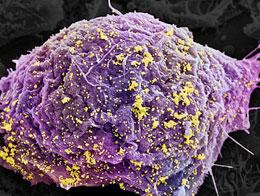via Nature News, by Ewen Callaway
 After decades of dashed hopes, AIDS vaccine developers are allowing themselves some cautious optimism. At a conference this week in Bangkok, Thailand, scientists reported molecular clues that help to explain the first-ever success of an HIV vaccine trial in humans (see 'Vaccine protects against HIV virus'). The results could point the way forward for designing future vaccines.
After decades of dashed hopes, AIDS vaccine developers are allowing themselves some cautious optimism. At a conference this week in Bangkok, Thailand, scientists reported molecular clues that help to explain the first-ever success of an HIV vaccine trial in humans (see 'Vaccine protects against HIV virus'). The results could point the way forward for designing future vaccines.
The study analyzed clinical samples from a previous HIV vaccine trial of more than 16,000 people that has been dubbed the 'Thai trial' but is officially called RV144. In 2009, scientists leading that trial reported that, after three years, people who received the vaccine were about 30 percent less likely to contract HIV than those who got a placebo.
The modest results marked the first successful human trial of an AIDS vaccine, two years after the high-profile failure of a vaccine produced by the pharmaceutical company Merck. But Thai trial results also left many researchers scratching their heads.
Read the rest.
[Content that is linked from other sources is for informational purposes and should not construe a Mapping Pathways position.]
 After decades of dashed hopes, AIDS vaccine developers are allowing themselves some cautious optimism. At a conference this week in Bangkok, Thailand, scientists reported molecular clues that help to explain the first-ever success of an HIV vaccine trial in humans (see 'Vaccine protects against HIV virus'). The results could point the way forward for designing future vaccines.
After decades of dashed hopes, AIDS vaccine developers are allowing themselves some cautious optimism. At a conference this week in Bangkok, Thailand, scientists reported molecular clues that help to explain the first-ever success of an HIV vaccine trial in humans (see 'Vaccine protects against HIV virus'). The results could point the way forward for designing future vaccines."You might say this is the most successful experiment we've had so far," says Adriano Boasso, an immunologist at Imperial College London.
The study analyzed clinical samples from a previous HIV vaccine trial of more than 16,000 people that has been dubbed the 'Thai trial' but is officially called RV144. In 2009, scientists leading that trial reported that, after three years, people who received the vaccine were about 30 percent less likely to contract HIV than those who got a placebo.
The modest results marked the first successful human trial of an AIDS vaccine, two years after the high-profile failure of a vaccine produced by the pharmaceutical company Merck. But Thai trial results also left many researchers scratching their heads.
Read the rest.
[Content that is linked from other sources is for informational purposes and should not construe a Mapping Pathways position.]

No comments:
Post a Comment